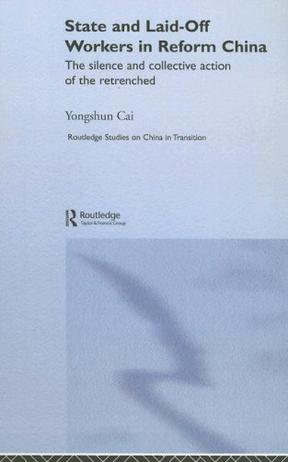欢迎来到相识电子书!
标签:蔡永顺
-
Collective Resistance in China
Although academics have paid much attention to contentious politics in China and elsewhere, research on the outcomes of social protests, both direct and indirect, in non-democracies is still limited. In this new work, Yongshun Cai combines original fieldwork with secondary sources to examine how social protest has become a viable method of resistance in China and, more importantly, why some collective actions succeed while others fail. Cai looks at the collective resistance of a range of social groups—peasants to workers to homeowners—and explores the outcomes of social protests in China by adopting an analytical framework that operationalizes the forcefulness of protestor action and the cost-benefit calculations of the government. He shows that a protesting group's ability to create and exploit the divide within the state, mobilize participants, or gain extra support directly affects the outcome of its collective action. Moreover, by exploring the government's response to social protests, the book addresses the resilience of the Chinese political system and its implications for social and political developments in China. -
State and Laid-Off Workers in Reform China
Reviews 'Cai's book has made a valuable contribution to our understanding of opportunity constraints that conditioned laid-off workers responses to the restructuring of SOEs. It would be useful not only for those who study the changing labor relations in China's economic transition, but also for those who are interested in popular contention and collective action in general.' - The China Review, Vol 7, No.1 -
State and Agents in China
Chinese government officials have played a crucial role in China's economic development, but they are also responsible for severe problems, including environmental pollution, violation of citizens' rights, failure in governance, and corruption. How does the Chinese Party-state respond when a government official commits a duty-related malfeasance or criminal activity? And how does it balance the potential political costs of disciplining its own agents versus the loss of legitimacy in tolerating their misdeeds? State and Agents in China explores how the party-state addresses this dilemma, uncovering the rationale behind the selective disciplining of government officials and its implications for governance in China. By examining the discipline of state agents, Cai shows how selective punishment becomes the means of balancing the need for and difficulties of disciplining agents, and explains why some erring agents are tolerated while others are punished. Cai finds that the effectiveness of punishing erring officials in China does not depend so much on the Party-state's capacity to detect and punish each erring official but on the threat it creates when the Party-state decides to mete out punishment. Importantly, the book also shows how relaxed discipline allows reform-minded officials to use rule-violating reform measures to address local problems, and how such reform measures have significant implications for the regime's resilience.
热门标签
下载排行榜
- 1 梦的解析:最佳译本
- 2 李鸿章全传
- 3 淡定的智慧
- 4 心理操控术
- 5 哈佛口才课
- 6 俗世奇人
- 7 日瓦戈医生
- 8 笑死你的逻辑学
- 9 历史老师没教过的历史
- 10 1分钟和陌生人成为朋友



